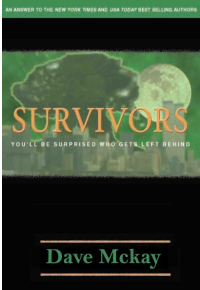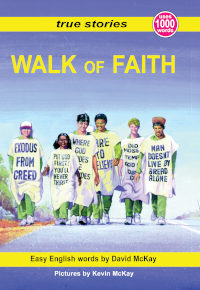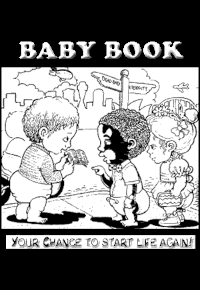 The word Babylon means "confusion". The Hebrew word "Babel" was used in the book of Genesis when describing a civilisation which grew up shortly after The Flood. At that time everyone spoke the same language. But this civilisation tried to build a tower up to heaven, in order to make themselves equal to God. God became angry with them and caused them to all start speaking in different languages, so that construction could no longer continue. The result, of course, was "confusion" or babble.
The word Babylon means "confusion". The Hebrew word "Babel" was used in the book of Genesis when describing a civilisation which grew up shortly after The Flood. At that time everyone spoke the same language. But this civilisation tried to build a tower up to heaven, in order to make themselves equal to God. God became angry with them and caused them to all start speaking in different languages, so that construction could no longer continue. The result, of course, was "confusion" or babble. (Genesis 11:1-9)
The Babylonian Empire, which rose long after the Genesis story, was, at its height, the greatest empire the world had ever known.
The hanging gardens of Babylon were one of the Seven Wonders of the Ancient World.
 But the Babylonian Empire is most famous for having invented money. Through the use of coins, made from precious and semi-precious metals, they were able to speed up commerce and build a more complex civilisation.
But the Babylonian Empire is most famous for having invented money. Through the use of coins, made from precious and semi-precious metals, they were able to speed up commerce and build a more complex civilisation. It is important to understand this dream in order to know what lies ahead for the world today.
The Dream
The story behind the dream is that the morning after having had the dream, the king was very troubled by it. He felt it was a significant dream; and yet he could not remember it. (Ever had that experience?) He asked his wise men to tell him the dream and its interpretation, but they insisted that they couldn't possibly interpret it without first being told what it was.
Daniel prayed and asked God to tell him what the dream was, so that he could give the interpretation; then he had a dream. When he shared it with the king, the king recognised it as the very same dream that he had had.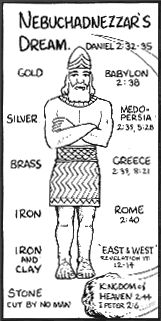
The dream was of a huge statue with a gold head that looked like Nebuchadnez-zar. The rest of the statue represented world empires that would come after him: Persia, Greece, Rome, and a final empire (represented by the feet and ten toes) which is to be an Alliance between several world rulers. (The Revelation 17:12-13.)
Finally, Daniel saw a stone come out of nowhere and hit the statue on its feet, thus destroying the entire structure. The stone grows into a huge mountain that fills the earth, and Daniel says that this stone is the kingdom of God.
The 'Kingdom of God' is the term Jesus used for his message. We believe Daniel was prophesying the return of Christ to judge all of man's systems, and establish God's eternal kingdom of faith and love on the earth.
The term Babylon is used in Bible prophecy to represent all the empires of man. But it will ultimately be destroyed by the kingdom of God.
Peter ends his letter from Rome with a greeting from "the church at Babylon." (1 Peter 5:13) This is because the Roman Empire was in power at that time.
In The Revelation, "Babylon the Whore" sits on seven mountains. The city of Rome was built on seven hills. But the hills mentioned in The Revelation also represent seven world empires. (Revelation 17:9-10)
Each empire is a human attempt (similar to the Tower of Babel) to imitate the kingdom of God (which Daniel described as a mountain that filled the earth). The seven world empires of recorded history are: Egypt, Assyria, Babylon, Persia, Greece, Rome, and one final one, which has not as yet appeared. But they are all called 'Babylon'.
Babylon in the Church
The influence of Babylon has sneaked into the church which Christ established, so that what passes for Christianity today is more loyal to the governments of the earth (Babylon) than to the kingdom of heaven.In the second world war the Catholic Church blessed the guns being used by both sides. And Protestant evangelicals always sing the praises of their country as though the kingdom of God and America (or Australia or some other Western country) were one and the same.
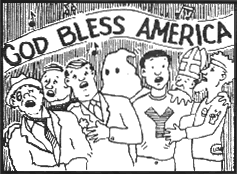
American churches always have a U.S. flag on the platform; and patriotism is a key plank in the platform of fundamentalist Christianity.
The word 'patriot' comes from the word 'father' and describes someone who recognises their country as their Father. If forced to choose between our Heavenly Father and Babylon, the church usually goes the way of the State, fanning the fires of patriotism and greasing the wheels of commerce.
Here is a simple test to verify this claim.
Take a command that Christ gave to his followers (see the list at the back of this book), and ask any churchgoer if people who break that rule are kicked out of their church. The response will almost certainly be one of defence for disobedience to Christ.
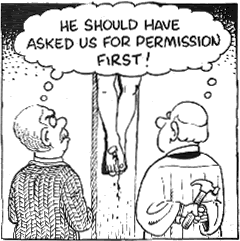 Then tell the same churchgoer that you know of a group teaching people to obey Jesus literally, and that they break the law by distributing literature without permission.
Then tell the same churchgoer that you know of a group teaching people to obey Jesus literally, and that they break the law by distributing literature without permission. Ask if such people would be welcome in their church. The usual reaction is to condemn the group for not abiding by "the laws of the land". And if the literature were distributed on church property, church leaders would be the first to call police.
Or try this test:
Ask them to tell you a dozen laws of the land; then ask them to tell you a dozen things that Christ told his followers to do. You'll be lucky to find one church goer in 1,000 who can tell you a dozen things that Jesus told his followers to do.
The reason? Because they follow the System, not Christ, so what Christ says doesn't really matter to them.
We have a situation identical to that in Sodom: A lot of religious talk, but very little real faith.
